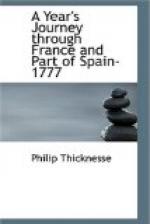Notwithstanding the sobriety, temperance, and fine climate of Spain, the Spaniards do not, in general, live to any great age; they put a prodigious quantity of spice into every thing they eat; and though sobriety and temperance are very commendable, there are countries where eating and drinking are carried to a great excess, by men much more virtuous than those, where temperance, perhaps, is their principal virtue.
LETTER XXIX.
I forgot to tell you that, though I left the Convent, I had no desire to leave the spot where I had met with so cordial a reception; nor a mountain, every part of which afforded so many scenes of wonder and delight. I therefore hired two rooms at a wretched posada, near the two ancient towers below, and where I had left my horse, that I might make my daily excursions on and about the mountain, as well as visit those little solitary habitations above once more. My host, his wife, and their son and daughter, looked rather cool upon us; they liked our money better than our company; and though I made their young child some little presents, it scarce afforded any return, but prevented rudeness, perhaps. The boys of the village, though I distributed a little money every day to the poor, frequently pelted me with stones, when they gained the high ground of me; and I found it necessary, when I walked out, to take my fuzee. I would have made a friend of the priest, if I could have found him, but he never appeared!—It was a poor village, and you may easily conceive our residence in such a little place, where no stranger ever staid above an hour, occasioned much speculation. My servant too (a French deserter) had neither the politeness nor the address so common to his countrymen; but I knew I was within a few hours of honest Pere Pascal; and while the hog, mule, and ass of my host continued well, I flattered myself I was not in much danger; had either of those animals been ill, I should have taken my leave; for if a suspicion had arose that an heretic was under their roof, they would have been at no loss to account for the cause or the calamity which had, or might befall them.—During my residence at this little posada, I saw a gaudy-dressed, little, ugly old man, and a handsome young woman, approach it; the man smiled in my face, which was the only smile I had seen in the face of a stranger for a fortnight; he told me, what he need not, that he was a Frenchman, and a noble Advocate of Perpignan; that his name was Anglois, and that his ancestors were English; that he had walked on foot, with his maid, from Barcelona, in order to pay his devotions to the Holy Virgin of Montserrat, though he had his own chaise and mules at Barcelona: he seemed much fatigued, so I gave him some chocolate, for he was determined, he said, to get up to the convent that night. During this interview, he embraced me several times, professed a most affectionate regard




